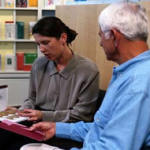What Is the Chance of Living with Prostate Cancer?
The stage of prostate cancer plays a key role in determining the chance of living with it. The more advanced stage you have, the worse outcome of the disease. But in general, having any cancer can cause variety of different impacts.
 The good news, most cases for cancer of prostate grow not-aggressively. In other words, mostly it gets worse slowly. Even there many men with it die due to other conditions, especially for those aged 50-60s or older.
The good news, most cases for cancer of prostate grow not-aggressively. In other words, mostly it gets worse slowly. Even there many men with it die due to other conditions, especially for those aged 50-60s or older.
Since this cancer tends to progress slowly, there are many men with it don’t realize when they have it for many years. The signs and symptoms are rarely found at early stage of the cancer.
The stage of prostate cancer is so crucial for the prognosis and outlook of patient. But the Gleason score and PSA level have an effect, too. See more the survival rates for cancer of prostate in here!
If there is no any symptoms, the cancer is usually at early stage (localized stage, this includes stage I and II), typically this suggests that the treatment for it is not immediately necessary but your doctor will keep monitoring the progression of the cancer. When there is a risk that the cancer might start to spread, the treatment is immediately necessary.
At localized stage, prostate cancer is less likely to affect your daily activities. In this phase, you should still be able to do your daily routines normally, including self-care, care for family, and even going to work.
However, there is a chance for depression and anxiety to affect you. Even though your cancer is still at early stage and has not spread yet, but cancer is cancer and it is a serious condition – and this may make you feel depressed and anxious, even may affect your sleep, too.
If the cancerous cells in the prostate start to progress, you are more likely to feel not well enough to perform all things you used to. In this phase, the cancer treatments are immediately necessary. But these treatments can carry the risk of some mild and serious side effects.
And when the cancer has spread to the nearby tissues or distinct organs, this can cause symptoms that may make you difficult to do all things you used to.
Whatever the stage of prostate cancer you have; try to give adequate time for any activities that you enjoy and with people you love. This can help for coping and relieving stress.
The cancerous tumor of prostate can be large enough and then this will affect the urethra, the tube that carries urine from the bladder to the male genital organ. As a result, you may experience some problems related to the way of how you pass the urine. These include:
- The increased frequency to urinate, particularly at night.
- A sudden or urgency feeling to pass urine.
- Decreased flow /stream of urine flow.
- Difficulty in completely emptying bladder.
- Blood may be found in the urine if there is an infection.
Urinary incontinence (leakage of urine) is another possible complication from prostate cancer. It is the loss of bladder control that can be an embarrassing problem.
Typically, it occurs after taking treatments for cancer of prostate such radiotherapy or prostate surgery. About 20 percent of men who take prostate removal surgery experience long term problems associated with mild urine leakage. Fortunately, for this kind of urinary incontinence is usually temporary.
In mild to moderate cases, practicing simple exercise (such as with pelvic-floor exercises) may be helpful enough to improve the problem. But for severe case, medical intervention or even the use of surgical-treatment option can be suggested.
While being diagnosed with cancer can make your family and friends closer, but over time it can lead to pressure on this relationship, causing relationship problems.
Most people around you may want to help, but many times they don’t clearly understand what to do. Furthermore, a few people may avoid you.
No matter the kind of relationship problem that you have, it’s important to be honest about what you feel and tell it to your family and friends! This can help people around you understand what you need.




Recently diagnosed wth small cell prostrate cancer. PSA went from .3 to 58 in year and a half, currently awaiting pathology results. Not finding much info on this type cancer. Only current symptom is frequent urination. need more info on prognosis if left untreated and most commonly recommended treatment, Also need best place to get treatment in Oklahoma City area. Currently using Urology Associates and they will probably refer me to Oklahoma Proton Center (formerly Procure)